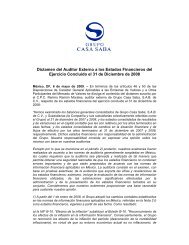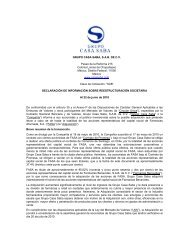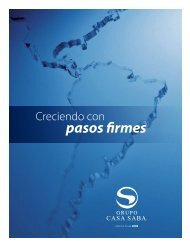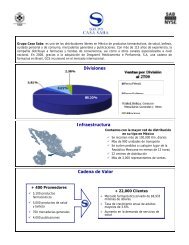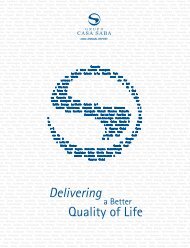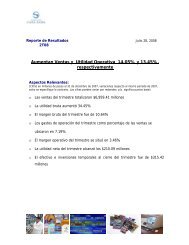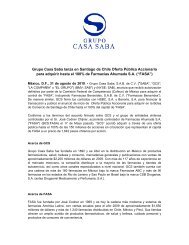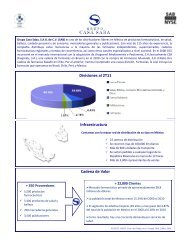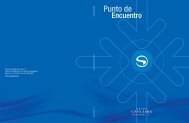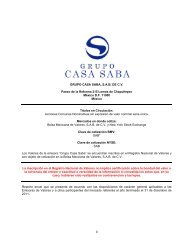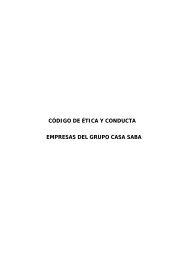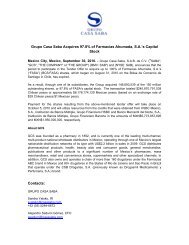FORM 20-F Grupo Casa Saba, S.A.B. de C.V.
FORM 20-F Grupo Casa Saba, S.A.B. de C.V.
FORM 20-F Grupo Casa Saba, S.A.B. de C.V.
Create successful ePaper yourself
Turn your PDF publications into a flip-book with our unique Google optimized e-Paper software.
Table of Contents<br />
As of the transition date, the Company will recognize its investments in subsidiaries and associates in its individual financial statements at their carrying value un<strong>de</strong>r prior GAAP.<br />
Assets and liabilities of subsidiaries<br />
IFRS 1 allows that if a holding company becomes a first-time adopter later than its subsidiary, in its consolidated financial statement, it should measure its assets and liabilities of the<br />
subsidiary on the date of transition at the same carrying values as in the IFRS financial statements of the subsidiary. Accordingly, the Company will value the assets and liabilities of its<br />
subsidiaries in Brazil and Chile that had adopted IFRS before the Company did at the same carrying values that they have in the financial statements un<strong>de</strong>r IFRS of those subsidiaries.<br />
Business combinations<br />
IFRS 1 allows IFRS 3, "Business combinations" (IFRS 3) to be applied prospectively, as of the transition date or from a specific date prior to the transition date.<br />
The Company will apply IFRS 3 prospectively to business combinations that occur as of the transition date. Therefore, the business combinations agreed upon prior to the transition<br />
date will not be reestablished. Consequently, the goodwill balance <strong>de</strong>termined in accordance with prior GAAP at the transition date was not affected by the migration. Consequently,<br />
the carrying amount of the assets acquired and liabilities assumed in the business combination will be their attributed cost, in accordance with IFRS on that date.<br />
Tax criteria<br />
Un<strong>de</strong>r Mexican FRS, the tax effect of a tax criterion is <strong>de</strong>termined in accordance with a mo<strong>de</strong>l of likelihoods. In accordance with IFRS, that effect is recognized un<strong>de</strong>r the confi<strong>de</strong>nce level<br />
that a tax position acquires or expects to acquire. Therefore, the tax effect of a position should be recognized if it meets the "more likely than not" based on its technical merits. If a tax<br />
position is not consi<strong>de</strong>red as "more likely than not", no benefit of the position will be recognized in the financial statements.<br />
Management is about to <strong>de</strong>termine if there are effects associated with uncertain tax liabilities that might result in the recognition of a provision in its opening statement of financial<br />
position un<strong>de</strong>r IFRS, which it will apply against the opening balance of retained earnings.<br />
Impact of inflation<br />
In accordance with Mexican FRS B-10, the impact of inflation is recognized when the economic environment of the entity is inflationary (inflation equal to or above 26 percent<br />
accumulated in the three annual prior fiscal years). For IAS 29, ”Financial Reporting in Hyperinflationary Economy” an economy is hyperinflationary when inflation in that period<br />
approximates or exceeds 100 percent.<br />
The last hyperinflationary period for Mexico was 1997 (Brazilian and Chilean operations were acquired in <strong>20</strong>08 and <strong>20</strong>10, respectively). Accordingly, the Company will eliminate the<br />
impact of inflation previously recor<strong>de</strong>d in Mexico for the period of 1998 up to December 31, <strong>20</strong>07.<br />
Estimates<br />
The estimates conducted by the Company un<strong>de</strong>r IFRS 1 as of the transition date are consistent with the estimates previously recor<strong>de</strong>d un<strong>de</strong>r MFRS at that same date.<br />
Un<strong>de</strong>r U.S. GAAP<br />
There are no significant new accounting pronouncements effective in year <strong>20</strong>11 impacting the Group.<br />
New ASU applicable to the Company are as follows:<br />
● ASU <strong>20</strong>11-05 “Comprehensive Income (Topic 2<strong>20</strong>): Presentation of Comprehensive Income” issued in June <strong>20</strong>11 (ASU <strong>20</strong>11-05)<br />
88



